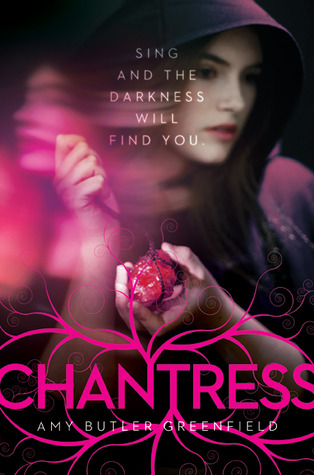Review: Chantress by Amy Butler Greenfield
Goodreads
Release date: May 7th, 2013
Publisher: Simon Pulse
Rating: An original, entertaining concept with a few too many info-dumps and a sagging middle. But I liked it, particularly the ending.

Lucy’s Chantress magic will make her the most powerful—and most hunted—girl in England.
“Sing, and the darkness will find you.” This warning has haunted fifteen-year-old Lucy ever since she was eight and shipwrecked on a lonely island. Lucy’s guardian, Norrie, has lots of rules, but the most important is that Lucy must never sing. Not ever. Now it is 1667, Lucy is fifteen, and on All Hallows’ Eve, Lucy hears a tantalizing melody on the wind. She can’t help but sing—and she is swept into darkness.
When she awakes in England, Lucy hears powerful men discussing Chantresses—women who can sing magic into the world. They are hunting her, but she escapes and finds sanctuary with the Invisible College, an organization plotting to overthrow the nefarious Lord Protector. The only person powerful enough to bring about his downfall is a Chantress. And Lucy is the last one in England.
Lucy struggles to master the song-spells and harness her power, but the Lord Protector is moving quickly. And her feelings for Nat, an Invisible College apprentice and scientist who deeply distrusts her magic, only add to her confusion...
Time is running out, and the fate of England hangs in the balance in this entrancing novel that is atmospheric and lyrical, dangerous and romantic.
The cover: I LOVE THIS COVER. It is so pretty and dramatic, with the bright hot pink against the black and her awesome hood and branch-y, swirly bits. Mildly disappointed to realize she's holding a pendant in her hand, instead of a heart and a dagger, like I'd originally thought, but it ties into the novel, so I'll get over it.
The story: With a synopsis like that (HISTORICAL MAGICAL ENGLAND. Those are three of my favorite words), I expecting to love this book. And while it wasn't quite a love, it was definitely a like. I had a tough time getting into it, and the middle was very slow, but there's a lot of good happening here.
The good:

Chantress magic: I love the concept of magic conjured through singing, and the dichotomy of Wild Magic vs. Proven magic, and all the magical training Lucy has to go through once she's magically transported off her barren island straight into London. Lucy's journey with her magic, grappling with her power and struggling with her destiny, was very interesting and well-executed and had a satisfying ending.
The world-building: The very best part of this whole novel was the background stuff on Scargrave, the big, bad baddy, and his evil flock of Shadowgrim, which... I won't tell you what they are, but they fly, and they are freaky. Chantress is set in an alternate magical England. In this version, King Charles I survived the English Civil War, only to be blown up along with his whole family in a twist on the Gunpowder Plot

I am a British history nerd, by the way, so I have OPINIONS on this alterna-history that I will get to in a bit. After the whole royal family dies, a young boy becomes king. And creepy, Cromwell-esque Scargrave becomes Lord Protector. Basically, he's in charge, and he rules with an iron fist.
He's got magical creatures that sow fear throughout England, and Chantresses are to be locked up/executed on sight. Needless to say, suddenly appearing in Scargrave's London manor with her head bursting with Chantress song is not the safest thing poor Lucy's ever done.
Characters: I wanted to get to know Lucy a bit better, but I thought her a worthy, sympathetic heroine, enjoyed her connection to Nat, and adored Nat's scientific mentor, Pennebrygge. They're all members of this very cool thing called the Invisible College, which I also wish we could have gotten more of. But I didn't sense any flat-ness from the characters. They all had personalities, and though they felt a bit modern, I didn't really care. Also, the romance was nice. Not heart-stoppingly swoon-tastic or anything, but nice.
The ending: The ending is appropriately dramatic and tense. Lucy must make a Big Choice and Prove Herself Worthy and Save the World and all that jazz I like to see. The payoff duly pays. I approve.
The not-so-good:

Blah blah blah blah blah: The story starts off a little slow, but there's a good deal of action. Lucy gets ripped right out of her quiet island life, landing somewhere very dangerous, which all makes for entertaining reading. But then she escapes to somewhere safe, and... there is talking. So much talking. So, so, so VERY MUCH talking. I swear the middle 100 pages of this book consisted of nothing but people sitting at a table talking.This was, unfortunately, the way Greenfield chose to deliver all of the very necessary, very relevant world-building stuff, and I was starting to feel antsy. I craved action. Way too much stasis.
Like pouring molasses uphill in winter: So obviously, no action means slow going, right? It felt like it took a while to read this book, even though it's only about 330 pages, and I blame that squarely on the pacing in the middle portion of Chantress. There are only so many revelatory conversations I can read about until I go stark raving mad. Again, I wasn't quite bored, really, since all their conversations were about cool things--what the Shadowgrims are, how Chantress magic works, etc--but it was kind of ridiculous. "Oh, how revolutionary! They're sitting And talking. I am shocked."
 |
| A disgusted husky= a disgusky |
The world-building: Yes, I just spent a paragraph up there in the Good section talking about how awesome the world-building is in Chantress, and it is good... except that it's very strange. It takes so much liberty with actual historical fact that I wonder why Greenfield bothered making it a historical at all. Maybe because she liked the images of the Tower and seventeenth century London so much? But if that were true, why not try to make your world adhere more closely to what actually happened? I don't know. I kept forgetting I wasn't reading high fantasy. I felt like this book was too in the middle, unable to decide which genre it was. It should have committed one way or the other, because I would have loved both.
In the end, I liked it. I had problems with it, but it's very well-written and so very unique. It doesn't really remind me of any other book I've read, and I'll definitely be sticking with the series. Plus, the cover is so dang gorgeous. *pets the pretty* *has very good reasons for liking things*













Oooh, I hate when books can't decide what to be. Sounds like this might have been awesome if it had gone for historical and left out some of the fantasy. Or something. Genre-blending can be amazing, but it's hard to do properly.
ReplyDeleteI really wish she'd found a way of incorporating all the magic-ness into more accurate history. Or just kept all the world-building she had, but made it not be England. I would have preferred the historical, though. It would have been more unique. I mean, I kept forgetting it was historical, because nothing about it was remotely close to what England in 1667 was like.
DeleteGreat review :D Never heard of this book before, but I find the cover a bit pretty :) Thank you for sharing your review. <3 I'm glad you enjoyed it, even though you had some problems. Glad to hear the writing is good ;D
ReplyDeleteGlad you liked it! :)
DeleteWorld-building is a huuuuuuuuuuuge pet peeve of mine. Sometimes there isn't enough. Sometimes there's too much. Sometimes it's all over the place. It sounds like in Chantress the author relied TOO much on world-building/atmosphere and too little on you know, THINGS HAPPENING. I'm still going to find a way to read this one, because I think for me the good might overpower the bad. We'll see!
ReplyDelete(Love the Joaquin GIF! He was so creepy in that movie.)
Molli